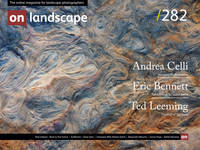Treating Your Art Like it’s Yours

Eric Bennett
As a full-time nature photographer, author, and conservationist, I hope to share the value that wilderness has in its pure, unaltered state. In a world where we are disconnecting from nature more and more every day, I can’t think of another pursuit more worthy of my time and energy. I believe that if I can capture a scene in the right way, my photographs will inspire others to protect the last few wild places we still have left.
I currently live just outside of Salt Lake City, Utah with my wife and three children. While much of my photography is focused on the incredible scenery near my home, I have traveled to over thirty countries to capture the diverse and remarkable beauty of all different environments.
I would recommend you ignore the ‘success’ of your photos entirely and post whatever you feel like. Having confidence in your art does not suggest that you expect everyone to love everything you share. True confidence is knowing full well that not everyone will like your work but still sharing it anyways. Confidence isn’t just being undeterred by criticism, it’s also being unaffected by praise. If the audience is influencing your opinion of your art–negatively or positively–then I would suggest you work on deepening the relationship you have with your art.
The above quote is an excerpt from an article I previously published titled “The Means, Not the End”, which focuses on some of the most significant ways that social media, smartphones, and the internet have reshaped photography. This seemed to be the idea that resonated with readers the most, as it was the most shared quote from the article. However, I felt it was something important enough to write about in greater detail, as I think the idea of artistic confidence is widely misconstrued.
With the high volume of people that most of us can reach today via social media and the internet, confidence is more important than ever.
Undeterred by Criticism
Many artists from all different mediums have described publishing work as painful. In Truman Capote’s words, “like you took a child out in the backyard and shot it.” As if we are throwing our precious babies to the wolves or giving pearls to swine, sharing something sacred with people that might not show it the kind of reverence, we feel it deserves. However, I suspect this defeatist attitude comes from placing too much importance on how our work is received instead of being fully satisfied with how we feel about it ourselves.
We are all aware that negative comments if taken too seriously, can be detrimental to any craft, especially something as personal as our artwork. I know several talented photographers, writers, and musicians that unfortunately decided to stop sharing and even creating altogether because of the kinds of insults, accusations, and criticism they were receiving from strangers online. If given the power, they can drain your motivation and even change the way you personally feel about your work. What was once a strong passion can suddenly feel like a meaningless pursuit.


